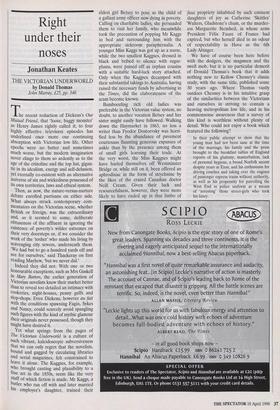Right under their noses
Jonathan Keates
THE VICTORIAN UNDERWORLD by Donald Thomas John Murray, £25, pp. 346 The recent reduction of Dickens's Our Mutual Friend, that 'loose, baggy monster' as Henry James rightly called it, to four highly effective television episodes has underlined once more our continuing absorption with Victorian low life. Other epochs were no better and sometimes much worse, but the modern imagination never clings to them so ardently as to the age of the crinoline and the top hat, gigan- tic in its idealism, energy and self-delusion, yet eternally co-existent with an alternative universe of sin and wickedness possessed of its own territories, laws and ethical system.
Then, as now, the nature-versus-nurture debate enrolled partisans on either side. What always struck contemporary com- mentators on the Victorian scene, whether British or foreign, was the extraordinary and, as it seemed to some, deliberate obtuseness of the affluent in ignoring the existence of poverty's wilder extremes on their very doorsteps or, if we consider the work of the losher' who made his living by scavenging city sewers, underneath them. We had but to go a hundred yards off and see for ourselves,' said Thackeray on first reading Mayhew, 'but we never did.'
Indeed they did not. With one or two honourable exceptions, such as Mrs Gaskell in Mary Barton, the earlier generation of Victorian novelists knew their market better than to reveal too detailed an intimacy with rookeries, night-houses, penny gaffs and slop-shops. Even Dickens, however au fait with the conditions spawning Fagin, Sykes and Nancy, could scarcely avoid spangling such figures with the kind of mythic glamour their originals never possessed, though they might have desired it.
Yet what springs from the pages of The Victorian Underworld is a culture of such vibrant, kaleidoscopic subversiveness that we can only regret that the novelists, bound and gagged by circulating libraries and serial magazines, felt constrained to leave it alone. The Kaggses, for example, who brought canting and plausibility to a fine art in the 1850s, seem like the very stuff of which fiction is made. Mr Kaggs, a butler who ran off with and later married his employer's daughter, trained their eldest girl Betsey to pose as the child of a gallant army officer now dying in poverty. Calling on charitable ladies, she persuaded them to visit her family, who meanwhile took the precaution of popping Mr Kaggs in bed and surrounding him with the appropriate sickroom paraphernalia. A younger Miss Kaggs was got up as a nurse, while the two smallest Kaggses, dressed in black and bribed to silence with sugar- plums, were passed off as orphan cousins with a suitable hard-luck story attached. Only when the Kaggses decamped with their substantial takings to Australia, having raised the necessary funds by advertising in the Times, did the elaborateness of the scam become known.
Bamboozling rich old ladies was preferable in the Victorian value system, no doubt, to another vocation Betsey and her sister might easily have followed. Walking down the Haymarket in 1863, no less a writer than Fyodor Dostoevsky was horri- fied less by the abundance of pavement courtesans flaunting generous expanses of ankle than by the presence among them of small girls learning their trade. At the very worst, the Miss Kaggses might have hurled themselves off Westminster Bridge or, while still on it, been offered an aphrodisiac in the form of strychnine by the likes of the crazed Canadian doctor Neill Cream. Given their luck and resourcefulness, however, they were more likely to have ended up in that limbo of faux propriety inhabited by such eminent daughters of joy as Catherine 'Skittles' 'Walters, Gladstone's chum, or the murder- ess Marguerite Steinheil, in whose arms President Felix Faure of France had expired, but who herself died in an odour of respectability in Hove as the 6th Lady Abinger.
We have of course been here before with the dodgers, the magsmen and the swell mob, but it is no particular demerit of Donald Thomas's book that it adds nothing new to Kellow Chesney's classic study, with the same title, published some 30 years ago. Where Thomas vastly outdoes Chesney is in his intuitive grasp of the similarities between the Victorians and ourselves in striving to contain a heaving metropolitan low life, and in his commonsense awareness that a survey of this kind is worthless without plenty of detail. Who could not enjoy a book which featured the following?
In their public attempt to show that the young man had not been sane at the time of the marriage, his family and the press brought to the breakfast tables of England reports of his gluttony, masturbation, lack of personal hygiene, a broad Norfolk accent despite years at Eton, and his enthusiasm for driving coaches and taking over the engines of passenger express trains without authority, as well as his propensity for patrolling the West End in police uniform as a means of 'arresting' those street-girls who took his fancy,


























































 Previous page
Previous page